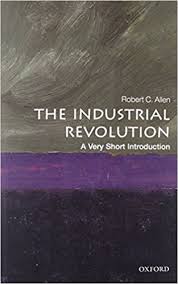Syllabus ECON2101W Economic History of Europe
Course and Instructor Information |
Course Title: Economic History of Europe (ECON2101W ) Credits: 3 Prerequisites: ECON 1200 or both 1201and 1202; ENGL 1010 or 1011 or 2011 or 3800 Instructor: Richard N. Langlois E-mail: richard.langlois@uconn.edu Phone: (860) 486-3472
Office Hours: T-TH 9:00-11:00, Oak 304
Course Materials |
Required Text: A Concise Economic History of the World by Rondo Cameron and Larry Neal Oxford University Press, 5th edition, 2016. (Earlier editions are fine. The fourth edition is available on archive.org.) Required Text: The Industrial Revolution: a Very Short Introduction by Robert C. Allen Oxford University Press, 2017. Recommended Text Guns, Germs, and Steel by Jared Diamond W. W. Norton and Company, 1999. (Available on archive.org.) The developer of this course is Richard N. Langlois, Professor of Economics at the University of Connecticut.
Course Description |
This course studies the economic development of Europe from prehistoric times to the early twentieth century. Although the course is chronological, the vastness of such a history necessarily means that we will be selective in our treatment, focusing on a few episodes and approaches. In general, the course will try to explain the uniqueness of Western Europe. Why was Western Europe (including Great Britain) able to achieve sustained economic growth in a way that no other part of the world – including the great civilizations of history – was able to do?
Course Goals |
At the completion of this course, you will be able to:
- Explain and manipulate theories of economic growth and related economic concepts.
- Identify key historical phenomena in time and relate them to economic concepts and theories.
- Analyze the economics of the ancient Mediterranean and the rise and fall of Rome
- Analyze the economics of the European Middle Ages, including the Manorial System, the Open-Field System, and the Enclosure Movement..
- Analyze the economics of Mercantilism and the nation-state in the Early Modern Period.
- Analyze the concept of the Industrial Revolution and be able to evaluate the reasons why the industrial revolution took place in Britain.
- Discuss the history and economics of British economic and political dominance in the nineteenth century.
Grading |
Course requirements
Your grade will be based on two midterms, a final, and a major writing assignment that you will work on in the discussion section to which you have been assigned..
Writing Assignment: Structured Paper
This is a “W” course. That means that much of your grade must depend on a writing assignment graded for writing style as well as content. I take this requirement seriously.
Your assignment will be what I call a “structured” paper. That is, it will be a long (20 pp+) paper that will follow a preset outline. Sections of the paper will be due over the course of the semester. You will write the paper under the guidance of your section instructor, who will also grade the paper.. Your discussion section has its own HuskyCT page.
At the end of the semester, you will put all the pieces together and turn in a finished paper on the last day of class. You should also keep a running bibliography, to which you can add with each succeeding section. Your paper should develop the following theme, which is essentially the theme of the course: what were the social institutions and economic conditions that led this country to develop (or fail to develop) economically? I encourage and expect you to find sources and references beyond what I have assigned for class readings.
Schedule of Assignments
Week Assignment due Comments Jan 31 Proposal One page: choose a country and give reasons for your interest in it. Feb 15 Ancient Before the year 1000 Mar 2 Medieval 1000-1500 Mar 24 Mercantilist 1500-1750 Apr 11 Industrial 1750-1914 Apr 27 Final version of paper All sections rewritten, with complete bibliography.
Note: The terms “medieval,” “mercantilist,” etc., are common labels for periods of development in the most advanced countries of Western Europe. Your country may not follow this pattern very well. Use the dates given as your guide.
The writing assignment will count for 45 per cent of your course grade. (As this is a W course, however, the rule is that you cannot pass the course if you do not pass the writing assignment.) I will grade each installment separately. The four installments will be worth five per cent of the course grade each. You may revise the installments and resubmit them to me for additional comments; but your installment grade will not change, that is, your grade for each installment will be based on the first submission. I reserve the right to lower your grade in any installment that you submit after the deadline — the later the submission, the lower the grade. Instruction in writing is part of the curriculum for the course. You will receive extensive feedback on your installments. And you are expected to watch the writing videos linked on the left menu in HuskyCT. In fact, you should rewatch them several times over the semester as you work on your paper. If you have questions about writing, post them to the Ask the Professor discussion so everyone can benefit from the answers.
Exams
Exams will be online in HuskyCT but will take place in class. I strongly adivse you to bring a laptop for these exams. Do not rely on a tablet or a phone. I will provide more information on the exams in class as the time nears.
The first exam will be Thursday 2/23/23, 2:00-3:15 p.m. The second will be on Thursday 4/13/23, 2:00-3:15 p.m. The final will be given at the time specified by the Registrar’s Office. That time will appear in your student center in Student Admin later in the semester.
The first midterm will cover the material in Modules 1 and 2. The second midterm will cover the material in Modules 3 and 4. The final will be cumulative, but will stress the material in Modules 5 and 6.
Course grading summary
Midterm Exam #1 15%
Midterm Exam #2 15%
Final exam 25%
Paper Installment 1 5%
Paper Installment 2 5%
Paper Installment 3 5%
Paper Installment 4 5%
Final draft 25%
Course schedule |
|
Module |
Open Date: |
Close Date: |
|
See Learning Modules links in the left menu for complete assignments and course materials. |
||
| Module 1: Theories of Economic Growth | January 17, 2023 | January 31, 2023 |
| Module 2: Ancient Economies. | February 1, 2023 | February 15, 2023 |
| Module 3: The Medieval Economy. | February 16, 2023 | March 2, 2023 |
| Module 4: The Mercantilist Economy. | March 3, 2023 | March 24, 2023 |
| Module 5: The Industrial Revolution | March 25, 2023 | April 11, 2023 |
| Module 6: Britain and the World in the 19th Century | April 12, 2023 | April 27, 2023 |
Student Responsibilities and Resources |
As a member of the University of Connecticut student community, you are held to certain standards and academic policies. In addition, there are numerous resources available to help you succeed in your academic work. This section provides a brief overview to important standards, policies and resources.
Student Code
You are responsible for acting in accordance with the University of Connecticut’s Student Code Review and become familiar with these expectations. In particular, make sure you have read the section that applies to you on Academic Integrity:
- Academic Integrity in Undergraduate Education and Research
- Academic Integrity in Graduate Education and Research
Cheating and plagiarism are taken very seriously at the University of Connecticut. As a student, it is your responsibility to avoid plagiarism.
Copyrighted materials within the course are only for the use of students enrolled in the course for purposes associated with this course and may not be retained or further disseminated.
Netiquette and Communication
At all times, course communication with fellow students and the instructor are to be professional and courteous. It is expected that you proofread all your written communication, including discussion posts, assignment submissions, and mail messages. If you are new to online learning or need a netiquette refresher, please look at this guide titled, The Core Rules of Netiquette.
Academic Support Resources
Technology and Academic Help provides a guide to technical and academic assistance. Students needing special accommodations should work with the University’s Center for Students with Disabilities (CSD). You may contact CSD by calling (860) 486-2020 or by emailing csd@uconn.edu. If your request for accommodation is approved, CSD will send an accommodation letter directly to your instructor(s) so that special arrangements can be made. (Note: Student requests for accommodation must be filed each semester.) Blackboard measures and evaluates accessibility using two sets of standards: the WCAG 2.0 standards issued by the World Wide Web Consortium (W3C) and Section 508 of the Rehabilitation Act issued in the United States federal government.” (Retrieved March 24, 2013 from Blackboard’s website)
Software Requirements and Technical Help
The technical requirements for this course include:
- Word processing software
- Adobe Acrobat Reader
- Internet access
This course is completely facilitated online using the learning management platform, HuskyCT. If you have difficulty accessing HuskyCT, you can access the in person/live person support options available during regular business hours through HuskyTech. Students also have 24×7 Course Support including access to live chat, phone, and support documents. Accessing Your Course from a Foreign Country Some foreign countries may limit or prohibit access to certain US web-sites, including YouTube, HuskyCT and other sites required for completing your online course. It is your responsibility to review the course syllabus ahead of time and to understand any limitations there may be in accessing required content. Although using UConn’s VPN might or might not allow you to gain access to take the course, it is your responsibility to be aware of and abide by any laws and regulations where you are located.
Minimum Technical Skills
To be successful in this course, you will need the following technical skills:
- Use electronic mail with attachments.
- Save files in commonly used word processing program formats.
- Copy and paste text, graphics or hyperlinks.
- Work within two or more browser windows simultaneously.
- Open and access PDF files.
University students are expected to demonstrate competency in Computer Technology. Explore the Computer Technology Competencies page for more information.
Evaluation of the Course
Students will be provided an opportunity to evaluate instruction in this course using the University’s standard procedures, which are administered by the Office of Institutional Research and Effectiveness (OIRE). Additional informal formative surveys may also be administered within the course as an optional evaluation tool.


